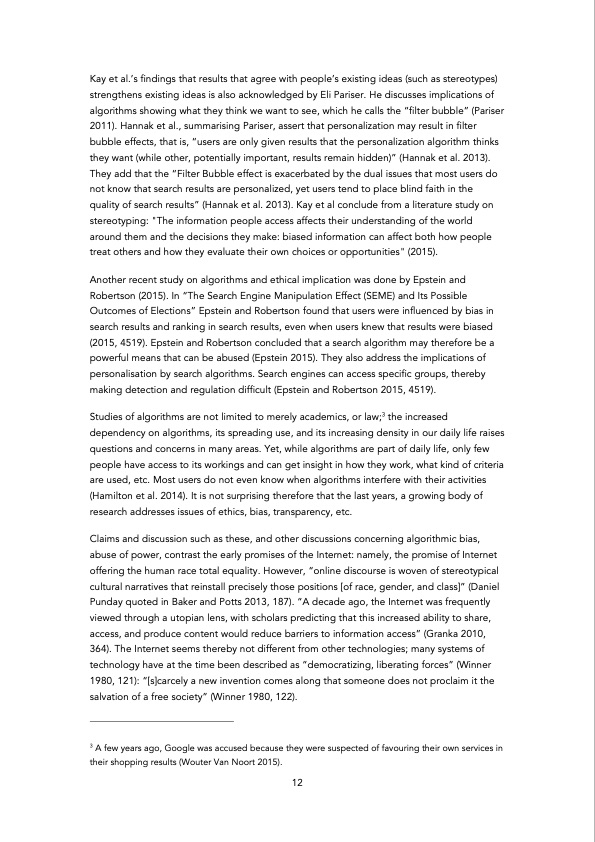
PDF Publication Title:
Text from PDF Page: 012
Kay et al.’s findings that results that agree with people’s existing ideas (such as stereotypes) strengthens existing ideas is also acknowledged by Eli Pariser. He discusses implications of algorithms showing what they think we want to see, which he calls the “filter bubble” (Pariser 2011). Hannak et al., summarising Pariser, assert that personalization may result in filter bubble effects, that is, “users are only given results that the personalization algorithm thinks they want (while other, potentially important, results remain hidden)” (Hannak et al. 2013). They add that the “Filter Bubble effect is exacerbated by the dual issues that most users do not know that search results are personalized, yet users tend to place blind faith in the quality of search results” (Hannak et al. 2013). Kay et al conclude from a literature study on stereotyping: "The information people access affects their understanding of the world around them and the decisions they make: biased information can affect both how people treat others and how they evaluate their own choices or opportunities" (2015). Another recent study on algorithms and ethical implication was done by Epstein and Robertson (2015). In “The Search Engine Manipulation Effect (SEME) and Its Possible Outcomes of Elections” Epstein and Robertson found that users were influenced by bias in search results and ranking in search results, even when users knew that results were biased (2015, 4519). Epstein and Robertson concluded that a search algorithm may therefore be a powerful means that can be abused (Epstein 2015). They also address the implications of personalisation by search algorithms. Search engines can access specific groups, thereby making detection and regulation difficult (Epstein and Robertson 2015, 4519). Studies of algorithms are not limited to merely academics, or law;3 the increased dependency on algorithms, its spreading use, and its increasing density in our daily life raises questions and concerns in many areas. Yet, while algorithms are part of daily life, only few people have access to its workings and can get insight in how they work, what kind of criteria are used, etc. Most users do not even know when algorithms interfere with their activities (Hamilton et al. 2014). It is not surprising therefore that the last years, a growing body of research addresses issues of ethics, bias, transparency, etc. Claims and discussion such as these, and other discussions concerning algorithmic bias, abuse of power, contrast the early promises of the Internet: namely, the promise of Internet offering the human race total equality. However, “online discourse is woven of stereotypical cultural narratives that reinstall precisely those positions [of race, gender, and class]” (Daniel Punday quoted in Baker and Potts 2013, 187). “A decade ago, the Internet was frequently viewed through a utopian lens, with scholars predicting that this increased ability to share, access, and produce content would reduce barriers to information access” (Granka 2010, 364). The Internet seems thereby not different from other technologies; many systems of technology have at the time been described as “democratizing, liberating forces” (Winner 1980, 121): “[s]carcely a new invention comes along that someone does not proclaim it the salvation of a free society” (Winner 1980, 122). 3 A few years ago, Google was accused because they were suspected of favouring their own services in their shopping results (Wouter Van Noort 2015). 12PDF Image | peek into the discursive construction of the Google Search Algorithm: A critical discourse analysis

PDF Search Title:
peek into the discursive construction of the Google Search Algorithm: A critical discourse analysisOriginal File Name Searched:
thesis-google-search-algotithm.pdfDIY PDF Search: Google It | Yahoo | Bing
Cruise Ship Reviews | Luxury Resort | Jet | Yacht | and Travel Tech More Info
Cruising Review Topics and Articles More Info
Software based on Filemaker for the travel industry More Info
The Burgenstock Resort: Reviews on CruisingReview website... More Info
Resort Reviews: World Class resorts... More Info
The Riffelalp Resort: Reviews on CruisingReview website... More Info
| CONTACT TEL: 608-238-6001 Email: greg@cruisingreview.com | RSS | AMP |